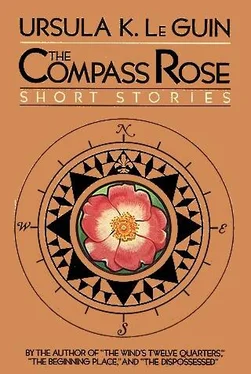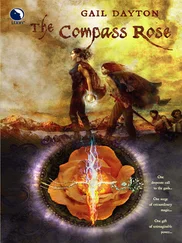“Here is now.”
“We used to think so,” I said, “but really we should use larger boxes.”
He gazed about him in mute bewilderment, and did not flinch even when the roof of the house was lifted off just like the lid of a box, letting in the unconscionable, inordinate light of the stars. He had just time to breathe, “Oh, wow!”
I have identified the note that keeps sounding. I checked it on the mandolin before the glue melted. It is the note A, the one that drove the composer Schumann mad. It is a beautiful, clear tone, much clearer now that the stars are visible. I shall miss the cat. I wonder if he found what it was we lost?
Two Delays on the Northern Line

The river was in flood, embankments under water clear down the line from Brailava to Krasnoy. A two-hour train trip had stretched into an afternoon of shunting, waiting, crawling from one village siding to another all through the hills of the upper Molsen province in heavy, inexhaustible rain. Rain was bringing down an early twilight on the tracks, the thistles, the tin roofs, the far-off barn and single poplar tree of an outlying farm of a nameless village somewhere west of the capital, when this scene, which had sat in self-contained enigmatic patience outside the window for fifty minutes, was eclipsed by a screeching rash of blackness. “There’s the freight! Now we’ll get on,” said the salesman, who knew everything, and the family from Mesoval rejoiced. When the tracks, thistles, roofs, barn, and tree had reappeared, the train did begin to move, and quietly, unchanged, indifferent, these things disappeared backwards forever into the rainy dusk. The family from Mesoval and the salesman congratulated one another, “Now we’re off, it can’t be over half an hour, Krasnoy at last.” Eduard Orte reopened his book. When he looked up after reading a page or two it had got quite dark outside. Lights of a lone car on a road far away swung round and were lost. In the dark, deep in glimmering rain, he saw the line of the green window blind and under it his face.
He looked with assurance at that face. At twenty he had disliked it. At forty he owned it. Deep lines, long nose, long chin, that was Eduard Orte; he looked at him as an equal, without admiration or contempt. But he saw in the shape of the brows what people had seen when they used to say, “How you take after her,” “Eduard has his mother’s eyes,” stupidly, as if they were not his eyes, as if he had no claim to see the world for himself. But in the second twenty years he had made his claim good.
Despite the divagations and false starts of this day’s journey he knew where he was going and what would happen. His brother Nikolas would meet him at North Station, drive him eastward through the rainy city to the house where they had been born. Their mother would be sitting up in bed under the pink lamp. If this had been a mild attack she would look rather childlike and her voice would be thin; if it had been severe enough to frighten her into resistance, she would be alert and cheerful. They would ask each other questions and answer them. Then dinner downstairs, and a chat with Nikolas and his quiet wife, and to bed, hearing the rain on the windows of the bedroom where he had slept the first twenty years. Almost certainly his sister Retsia would not be there; she would have remembered she had left three small children in Solariy, and rushed back to them in a panic, just as she had rushed away from them. Nikolas would never have wired him, would simply have telephoned after the attack to give him the doctor’s report, but Retsia thrived on commotion, fled to bedsides, fired off telegrams, come at once, with more sense for the dramatic than of the ludicrous. Their mother, entirely content with Nikolas’s twice-weekly visits, had not the faintest desire to “see” either Eduard or Retsia, to have her routines disrupted and her hoarded vitality called upon for an expenditure of specious interest in their doings, which had not interested her for years. But Retsia needed the expectable, the conventional, so badly that she regularly employed the inconvenient to achieve it. When wired come at once to the sick mother’s bedside, one comes. To certain moves in chess only certain responses are possible. Eduard Orte, a stronger and more conscious adherent of convention than his sister, submitted his will to the rules without complaint. But it was like chess without a board, this tracking back and forth for nothing: the same pointless trip three times in two years, or was it three years since the first attack?—so pointless, such a waste of time that he scarcely cared if the train went on all night as it had done all afternoon, shifting from siding to siding in the hills, off the main line and getting no closer; it made no difference.
When he got off the train and found in the wet hubbub of the platform and the glare and echoes of North Station nobody to meet him, he felt let down, betrayed. The emotion was quite inappropriate. Nikolas would hardly have stayed to meet a train five hours late. Eduard considered calling the house to say he had arrived, and then wondered why the thought had entered his head. It had risen from his stupid disappointment at not being met. He went out to get a taxi. At the bus stop near the taxi stand, a 41 was waiting; without hesitation he walked to it and got onto it. It had been how long, ten years, fifteen, no, longer than, that, since he had ridden a bus crosstown through the loud streets of Krasnoy, dark and flashing in the March night, street lamps stretching reflections down into the rivers of black asphalt, as when he was a student riding home after late class at the University. The 41 stopped at the old stop at the foot of the Hill and a couple of students got on, pale, grave girls. The Molsen under Old Bridge ran very high in its stone embankments; everyone craned to see, and somebody behind him said, “It’s up over the warehouses down below Rail Bridge.” The bus groaned, swayed, stopped, lurched its way through the long straight streets of the Trasfiuve. Orte was the last but one to get off. The bus with its solitary passenger gasped its door shut and went on, leaving a quietness in its wake, the suburban quietness. Rain fell steadily. At the corner near a street lamp a young tree stood startled by light, its new leaves piercing green. There were no further delays or changes of route. Orte walked the last half block home.
He knocked softly, pushed the unlocked door open, and entered. For some reason the hall was brightly lighted. A loud voice was talking in the sitting room, a stranger’s voice. Was there a party gong on? As he took off his topcoat to hang it on the hall coatrack, a boy came careening past, stopped at a distance, and stared with bright, bold eyes.
“Who are you?” Orte asked, as the boy asked the same question, and as he answered, “Eduard Orte,” the boy gave the same answer.
For a moment his head spun with the dizziness that he dreaded, the abyss opening, the falling.
“I’m your uncle,” he said, tapping the rain off his hat and hanging it up. “Is your mother here?”
“In the piano room. With the funerals man.” The boy kept gazing, studying him, self-possessed, as if in his own house. Why did he not stand out of the way? I cannot go past him, Orte thought.
Retsia came into the hallway, saw him, cried, “Oh, Eduard!” and burst instantly into tears. “Oh, poor Eduard!”
She drew him with her, relinquishing him only to Nikolas, who shook his hand softly and seriously, saying in his even voice, “You’d left. We couldn’t reach you. Very easy, much suddener than expected, but very easy at the end…”
Читать дальше





